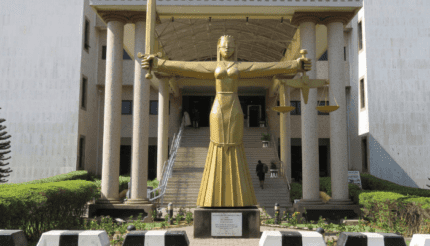NJC Receives List of 22 Justices for Supreme Court Elevation
The National Judicial Council (NJC) is set to undergo a significant transformation following the reception of a list comprising 22 nominees from the Court of Appeal for elevation to the esteemed Supreme Court. The Federal Judicial Service Commission (FJSC) disclosed this critical information, unveiling the names of the distinguished nominees originating from diverse regions across the nation. This announcement, contained within an FJSC document obtained by journalists on Thursday, marks a crucial step in augmenting the Supreme Court’s composition and fortifying its judicial arm.
This move follows the recent retirement of Justice Amina Augie, who departed from the bench after reaching the mandatory retirement age of 70. Justice Augie’s retirement further depleted the already diminished number of justices serving at the apex court, dwindling the count to a mere 11 justices. The infusion of these 22 new nominees seeks to bolster the Supreme Court’s capabilities and ensure a robust and representative judicial system.
Regional Representation in Supreme Court Nominees
Diversity and regional balance take precedence in the selection of nominees for elevation to the Supreme Court. The breakdown of the nominees indicates a concerted effort to ensure representation from various regions across Nigeria. The North-Central region leads with six nominees, while the South-East also boasts six nominees in the list. Meanwhile, the South-West and South-South regions each contribute two nominees, and the North-East and North-West regions have two and four nominees, respectively.
Among the prominent nominees are individuals like Honorable Justice Nwaoma Uwa from Abia State, Honorable Justice Moore Adumein from Bayelsa State, Honorable Justice Adewale Abiru from Lagos State, and Honorable Jummai Sankey from Plateau State, reflecting a diverse array of experiences and backgrounds within the nominee pool. This inclusive approach aims to uphold fairness and regional representation within the apex court’s structure.
Selection Criteria and Priorities
The list of nominees delineates a clear set of priorities and reserves, categorizing the nominees based on specific criteria. Each nominee is designated as a priority or reserve nominee, elucidating the selection hierarchy. Notably, this categorization underscores the importance of judicial qualifications and expertise in determining the nominees’ positions in the elevation process.
For instance, Honorable Justice Nwaoma Uwa and Honorable Justice Onyekachi Otisi, both hailing from Abia State, are listed as a priority and reserve nominee, respectively. This discerning selection process signifies a meticulous approach towards ensuring the best-qualified candidates are positioned to contribute effectively to the Supreme Court’s esteemed bench.
Addressing Vacancies and Ensuring Judicial Continuity
The recent retirement of Justice Amina Augie and the subsequent reduction in the number of serving justices underscored the critical need to address vacancies within the Supreme Court. The nomination of these 22 justices marks a significant step towards replenishing the depleted ranks and ensuring the court’s operational continuity.
This endeavor aligns with the overarching goal of maintaining a full and functional Supreme Court, capable of dispensing justice effectively and efficiently across various legal domains within Nigeria.
Next Steps in Confirmation and Impact on Judiciary
With the nomination list in hand, the NJC is poised to embark on the confirmation process for these nominated justices. The scrutiny and confirmation of these nominees will play a pivotal role in shaping the future landscape of the Nigerian judiciary. Upon successful confirmation, these justices will assume critical roles within the Supreme Court, influencing legal precedents, shaping judgments, and contributing significantly to the country’s legal framework.
The infusion of these new justices into the apex court not only ensures a fuller bench but also holds the promise of injecting fresh perspectives and expertise, ultimately bolstering the judiciary’s capacity to dispense justice effectively and uphold the rule of law.
This comprehensive report aims to provide an in-depth understanding of the recent nominations for elevation to the Supreme Court and their potential impact on the Nigerian judicial system.
This are the names of the 22 Nominees for Supreme Court
SOUTH EAST
1Hon Justice Nwaoma Uwa (Abia State)-Priority 1A.Hon Justice Onyekachi Otisi (Abia State) -Reserve
2Hon Justice Obande Ogbuinya (Ebonyi State)-Priority
2AHon Justice Theresa Orji-Abadua (Imo State)- Reserve
3Hon Justice Anthony Ogakwu (Enugu State)-Priority
3AHon Justice Chioma Nwosu-lheme (Imo State)-Reserve
SOUTH SOUTH
1Hon Justice Moore Adumein (Bayelsa State)-Priority
1AHon Justice Biobele Georgewill (Rivers State)-Reserve
SOUTH WEST
1Hon Justice Adewale Abiru (Lagos State)-Priority
1AHon Justice Olubunmi Oyewole (Osun State)-Reserve
NORTH CENTRAL
1Hon Jummai Sankey (Plateau State)-Priority
1A Hon Justice Muhammad Ibrahim Sirajo (Plateau)-Reserve
2Hon Justice Stephen Adah (Kogi State)-Priority
2A Hon Justice Ridman Maiwada Abdullahi (Nassarawa State) -Reserve
3Hon Justice Baba Idris (Niger State)-Priority
3AHon Justice Joseph Ikyegh (Benue State)-Reserve
NORTH EAST
1Hon Justice Haruna Simon Tsammani (Bauchi State)-Priority
1A Hon Justice Abubakar Talba (Adamawa State)
NORTH WEST
- Hon Justice Muhammad Lawal Shuaibu (Jigawa State)-Priority
1A. Hon Justice Bello Aliyu (Zamfara State) -Reserve
- Hon Justice Abubakar Sadiq Umar (Kebbi State)-Priority
Table of Contents
Discover more from OGM News NG
Subscribe to get the latest posts sent to your email.













